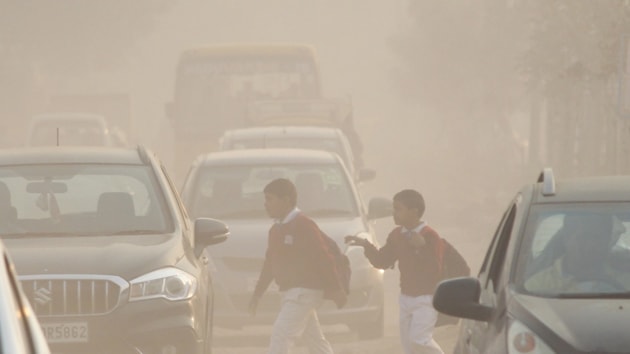Delhi’s air quality remains in ‘very poor’ zone, to dip further over next 2 days
A parliamentary panel met on Wednesday to take a stock of the measures taken and possible options for reducing air pollution.
New Delhi: Delhi’s air quality index (AQI) rose to 354 on Thursday morning as pollution levels remained in the “very poor” category for the second day amid a dip in the wind speed, according to the Central Pollution Control Board (CPCB) data.

The AQI in the national capital was 301, according to the 4 pm bulletin on Wednesday. Ghaziabad recorded an AQI of 366, Noida 320 and Gurugram 221. By 11 pm on Wednesday, the Delhi AQI climbed to 329. The national capital recorded an AQI of 242 on Tuesday when the pollution levels were in the poor category.
An AQI between 201 and 300 is considered poor. The 301-400 level falls in the very poor and 401-500 in the severe category, which is dangerous for vulnerable people such as children and the elderly. The AQI above 500 falls under the severe plus category.
Smoke from farm fires in Punjab and Haryana and a drop in wind speed pushed the air pollution levels to the very poor from the poor category on Wednesday. The factors were likely to persist and push the air quality into severe levels by Friday. Severe air pollution can worsen existing respiratory illnesses and also affect even healthy people.
The smoke, vehicle exhaust, and construction dust contribute to Delhi air pollution and the pollutants can lead to major health problems as they can enter the bloodstream after penetrating deep into the lungs.
Pollution spikes are common in the first half of November in northern India as farm fires peak in Punjab and Haryana during this time and the resulting smoke settles over the region. Farmers often burn stubble left behind after harvest as a quick and cheap way of clearing their fields for the next round of sowing.
The air quality begins improving by the third week of November. Experts have blamed prolonged monsoon and delayed harvest for the continued stubble burning, which usually ends completely by November 20. Delhi faces only emissions from local sources after that. Low wind speed and continuing stubble burning have led to the unusual spike in the pollution levels around this time of the year.
A dip in wind speed and temperatures worsens air quality by making air denser and trapping pollutants. Delhi recorded a minimum temperature of 12.5 degrees Celsius on Thursday morning and 89% humidity
The spike in the pollution levels came days after road rationing measures or the odd-even scheme as part of measures to deal with deteriorating air quality ended on November 15.
As part of the scheme, the use of private cars was restricted. The odd-even system that allows cars on alternate days based on whether their licence plates end in odd or even number was implemented after the AQI in Delhi hit the worst level—494—since 2016 on November 3 and forced closure of schools that have since reopened.
The CPCB on Wednesday said that it was closely monitoring the situation and may review pollution control measures on Thursday.
A parliamentary panel met on Wednesday to take a stock of the measures taken and possible options for reducing air pollution.
According to lawmakers present in the meeting, the Centre told the panel that it wants to convert all commercial vehicles to CNG, replace thermal-based plants by gas-based plants and disallow industries in specified areas.
A discussion on pollution was held in Parliament’s lower House—Lok Sabha—for a second day on Wednesday.



